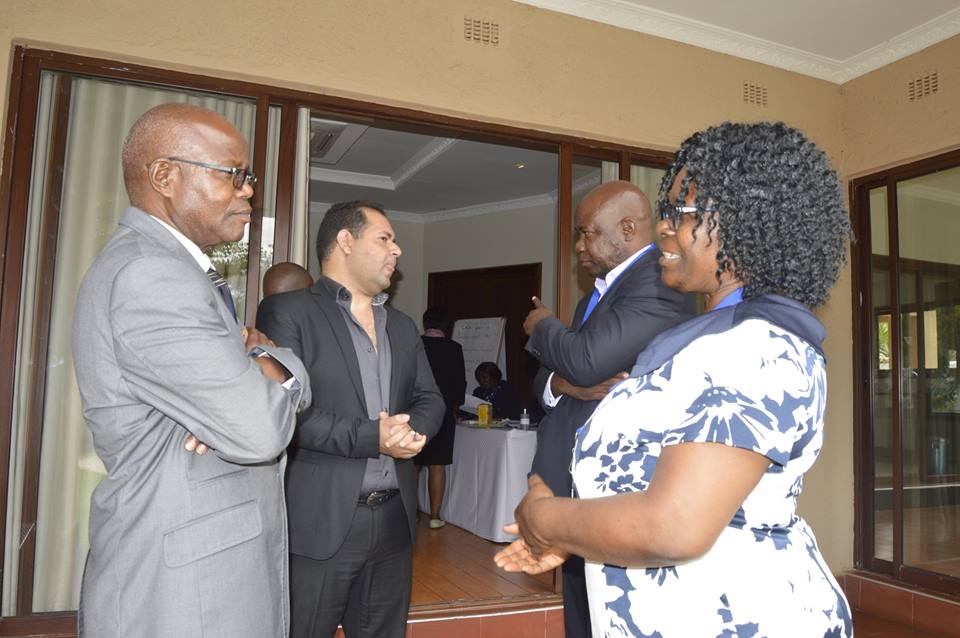National Biosafety Authority-UNE–GEF host February 2018 Twangale Park Sensitization Workshop
Notice: Undefined index: catFilterList in /home/zambi/public_html/wp-content/plugins/wp-likes/api.php on line 243

NBA Board Chairperson Dr Paul Zambezi (l) with UNEP Regional Advisor Dr Ossama AbdelKawy at First National Biosafety Clearing House Twangale Park in Lusaka
By Derrick Sinjela
THE National Biosafety Authority (NBA) a Zambian statutory body established through the Biosafety Act No. 10 of 2007, will hold a sensitization and awareness workshop in conjunction with the United Nations Environment –Global Environment Facility from the 20th to 21st February, 2018 at Twangale Park, for selected key stakeholders in order to establish the Biosafety Clearing House (BCH) as a fully functional and effective platform for implementation of the Cartagena protocol.
According to National Biosafety Authority Communications Officer, Sandra Lombe-Mulowa the sensitization and awareness meeting aim is to consolidate and intensify cooperation toward achieving common goals and objectives in the use and operation of the BCH in Zambia.
Ms. Lombe-Mulowa says electronic and print media houses are expected to cover the official opening on Tuesday 20th February, 2018 at 09:00 hours, whose Guest of honour is Ministry of Higher Education PS Mr Mabvuto Sakala.
Regional Advisors from the United Nations Environment Programme (UNEP) Dr Ossama Abdel-Kawy (Egypt) and Ms Lillian Munyah Nfor (Cameroon) are equally expected to speak at the same event.
“The NBA’s mandate is to regulate genetic engineering activities and is the focal point for Biosafety Clearing House (BCH). The BCH is a mechanism set up by the Cartagena Protocol on Biosafety to facilitate the exchange of information on Living Modified Organisms (LMOs) to which Zambia is party. The BCH provides global access to a variety of scientific, technical, environmental, legal and capacity building information. Zambia has operationalized the Protocol through the Biosafety Act No. 10 of 2007,” explained Ms. Lombe-Mulowa.
Ms. Lombe-Mulowa says Zambia has since operationalized the Convention through the Biosafety Act No. 10 of 2007 and the National Biosafety Authority is currently the focal point for Biosafety Clearing House.
Zambia’s key stakeholders will get a clear understanding of the common format of Biosafety Clearing House records, procedures for registering and publishing biosafety-related decisions; and technical national Biosafety Clearing House responsibilities, and impact on the institutional framework.
The National Biosafety Authority sensitization and awareness workshop goals include providing the Zambia’s key stakeholders; government representatives, industry, importers, producers, distributors, researchers, farmers and farming organizations outreach systems, major food and feed companies where appropriate, NGOs and civil society, and print and broadcast media) with a clear understanding of:
The first goal is seeking a common format of BCH records as well as the procedures for registering and publishing biosafety-related decisions.
Secondly, providing the technical national BCH responsibilities, and impact on the institutional processes for creating and registering BCH information and making biosafety related decisions, for example- registering and publishing records.
Thirdly, the identification of National procedures and operational linkages to gather information to be put on BCH in line with NBFs implementation and sustainability and training plan; with workshop objectives being twofold; define procedure or mechanisms to flow information onto the BCH (para 2.1 in the SSFA) and how to define roles of Competent National Authorities and National Focal Points (Form 1).
The Zambian government has launched the National Biosafety Authority (NBA), whose core business is to regulate genetically modified organisms (GMOs) or products of GMOs in the country. The launch that took place on November 26, 2015 at Radisson Blu Hotel, in Lusaka was officiated by the Minister of Higher Education, Dr. Michael Kaingu who said that the National Biosafety Authority is now fully functional in order to ensure that Zambia benefits from the safe application and use of modern biotechnology.
“Safety will now be ensured in the development, use and handling of all gene modification technologies and products thereof because the NBA has put in place a system for notification and handling applications for permits and other key matters of biosafety,” Dr. Kaingu said. During a parliamentary meeting held on December 2, 2015, members of parliament were informed by Hon. Dr. Michael Kaingu, that the Authority will oversee GM crop research. “We are now on a clear path for the development of biotechnology. Our scientists are hard working to regulate and develop genetically modified crops, and we now have the capacity to regulate them,” said Dr. Kaingu.
He informed parliament that his ministry in collaboration with the ministry of agriculture, livestock and fisheries has been working hand in hand to put in place a biosafety frameworkand policy. The minister indicated that other ministries involved in biotechnology and biosafety policy formulation included the ministries of health, lands, natural resources and environmental protection as well as the ministry of local government and housing.
For more information on the Zambian National Biosafety Authority, contact www.nbazambia.org.zm






















